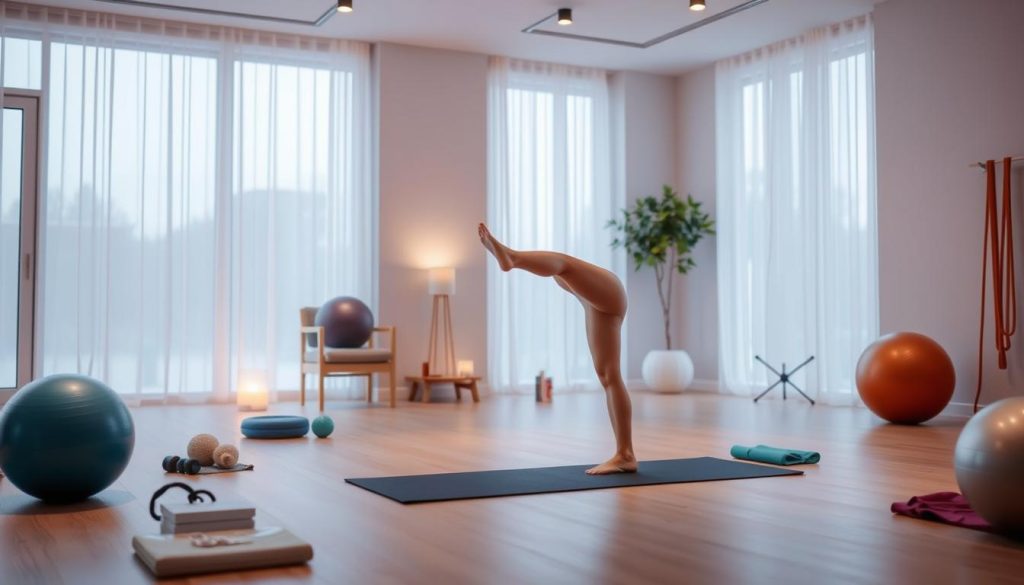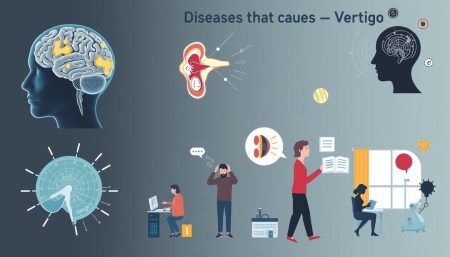Vertigo can make your world spin out of control. I know this firsthand. For months, I felt dizzy, making everyday tasks a challenge. But then, I found natural ways to fight vertigo.
Finding a cure for vertigo wasn’t simple. I tried many treatments before finding what worked. This is my story of beating vertigo with natural methods and lifestyle changes.
If you’re fighting vertigo, know there’s hope. My journey might give you new ideas for managing your symptoms. Let’s explore how to beat vertigo together.
My Journey with Debilitating Vertigo Symptoms
My fight against vertigo started without warning, turning my world upside down. What began as mild dizziness grew into a severe condition. It affected every part of my life.
First Signs and Early Symptoms
The first vertigo symptoms were small. I felt light-headed and had brief moments of imbalance. These signs grew stronger and more frequent, leading to:
- Spinning sensations
- Nausea and vomiting
- Difficulty focusing
- Ringing in the ears
Impact on Daily Life and Work
As vertigo worsened, everyday tasks became hard. Driving was unsafe, and my work suffered. I faced challenges with:
| Activity | Difficulty Level |
|---|---|
| Reading | High |
| Computer Work | Extreme |
| Social Interactions | Moderate |
| Physical Exercise | Very High |
Failed Traditional Medical Treatments
I tried many treatments for vertigo. Medications helped a bit but had side effects. Vestibular rehab showed hope but was slow. Managing vertigo became my main job, leading me to look for other options.
“Living with vertigo felt like being trapped on a never-ending roller coaster. I knew I had to find a cure to reclaim my life.”
Understanding Different Types of Vertigo
Vertigo isn’t the same for everyone. Each type needs its own treatment. Let’s look at the most common types and what makes them different.
BPPV is the most common type. It happens when tiny crystals in your inner ear move out of place. This causes short, dizzy spells when you move your head.
Meniere’s disease is another common type. It’s caused by fluid buildup in your inner ear. Symptoms include severe vertigo, hearing loss, and ringing in your ears. To manage symptoms, you might need to change your diet and take medication.
Vestibular neuritis is caused by inflammation of the vestibular nerve. It leads to sudden, severe vertigo that can last for days. Treatment usually involves managing symptoms and exercises to help your balance.
| Type of Vertigo | Main Symptoms | Common Treatments |
|---|---|---|
| BPPV | Brief episodes of dizziness | Epley maneuver, head exercises |
| Meniere’s Disease | Vertigo, hearing loss, tinnitus | Low-salt diet, diuretics, vestibular therapy |
| Vestibular Neuritis | Sudden, severe vertigo | Antivirals, vestibular exercises |
Knowing what type of vertigo you have is key to finding the right treatment. Talk to a doctor to figure out the best way to manage your symptoms and improve your life.
Critical Lifestyle Changes That Sparked Improvement
My journey to beat vertigo showed me powerful ways to cope. Making big lifestyle changes was crucial. These changes helped me treat vertigo in a holistic way, improving my life a lot.
Sleep Pattern Modifications
Changing my sleep habits was key to managing vertigo. I aimed for 7-9 hours of sleep each night. I also made my bedroom calm and avoided screens before bed to cut down on vertigo at night.
Dietary Adjustments
Changing my diet was also vital. I cut out foods like caffeine, alcohol, and high-sodium foods. I ate more fresh fruits, veggies, and lean proteins. Drinking plenty of water also helped reduce vertigo attacks.
Stress Management Techniques
Managing stress was crucial for my recovery. I started meditating and doing deep breathing exercises every day. I also did gentle yoga to relax and improve my balance. These activities not only helped with vertigo but also made me feel better overall.
| Lifestyle Change | Benefits | Implementation Tips |
|---|---|---|
| Sleep Improvement | Reduced vertigo episodes, better recovery | Consistent bedtime, dark room, no screens |
| Dietary Adjustments | Fewer triggers, improved balance | Limit caffeine, alcohol; increase water intake |
| Stress Management | Decreased symptom intensity, better coping | Daily meditation, yoga, deep breathing exercises |
How I Cured My Vertigo Through Natural Methods
My quest to beat vertigo led me to try many natural remedies. After months of trying different things, I found a mix that worked. The Epley maneuver was key for quick relief. It’s a simple head move that helps the crystals in my inner ear, making me less dizzy.

I also started doing Brandt-Daroff exercises every day. These sit-on-the-bed exercises improved my balance and cut down on vertigo. After a few weeks of doing them, I saw big improvements.
Ginger tea became a big help for me. It’s known for its anti-inflammatory effects, which calm the nervous system and reduce nausea. I drank ginger tea every morning and night, and it helped me feel more stable.
Drinking more water was also important for me. Staying hydrated helped keep the right balance in my inner ear. This simple change really helped reduce how often I got vertigo.
These natural remedies and lifestyle changes helped me cure my vertigo. It took time and effort, but the natural way worked best for me. It helped me manage my symptoms and improve my life quality.
Essential Supplements and Vitamins for Vertigo Relief
Natural remedies for vertigo often include specific supplements and vitamins. These can play a crucial role in managing symptoms and promoting overall vestibular health. Let’s explore some key nutrients that have shown promise in vertigo relief.
Vitamin D and B12 Supplementation
Vitamin D deficiency has been linked to vertigo episodes. Supplementing with this crucial nutrient may help reduce symptoms. Vitamin B12 supports nerve health, potentially easing vertigo-related issues. Many people find relief by incorporating these vitamins into their daily routine.
Magnesium’s Role in Recovery
Magnesium is a mineral that plays a vital role in nerve function and muscle relaxation. For those experiencing vertigo, magnesium supplements may help calm the nervous system and reduce dizziness. It’s one of the popular vertigo supplements and vitamins recommended by health professionals.
Natural Herbs and Minerals
Several herbs and minerals have shown potential in managing vertigo symptoms. Ginkgo biloba, for instance, may improve blood flow to the brain, potentially reducing dizziness. Ginger is another natural remedy for vertigo that can help with nausea and balance issues.
| Supplement | Potential Benefits |
|---|---|
| Vitamin D | Reduces vertigo episodes |
| Vitamin B12 | Supports nerve health |
| Magnesium | Calms nervous system |
| Ginkgo biloba | Improves brain blood flow |
| Ginger | Helps with nausea and balance |
While these supplements show promise, it’s essential to consult with a healthcare provider before starting any new regimen. They can help determine the right combination of vertigo supplements and vitamins for your specific needs.
Physical Therapy Exercises That Made a Difference

Physical therapy exercises were key in my fight against vertigo. They focused on balance, coordination, and how the body handles movement. These exercises were a big help in my recovery.
The Epley maneuver was a big game-changer for me. It involves moving the head in specific ways to help the inner ear. This often gave me quick relief from feeling dizzy. I did this exercise every day and saw my vertigo episodes decrease.
Balance exercises were also crucial. Standing on one foot and looking at a fixed point helped me stay steady. I started with short times and got better as I practiced longer.
Gaze stabilization exercises were another important part of my treatment. These exercises involve moving the head while keeping eyes on a target. I started slow and got faster, improving my focus during head movements.
Adding these exercises to my daily routine was tough at first. But sticking with it paid off. Always talk to a physical therapist before starting any new exercises.
The Power of Vestibular Rehabilitation
Vestibular rehabilitation is a game-changer for managing vertigo symptoms. This therapy focuses on exercises that retrain your brain to process balance signals correctly. It’s one of the most effective vertigo treatment options available today.
Balance Training Exercises
Balance training is crucial for vertigo recovery. These exercises challenge your balance system, helping it adapt and improve. Start with simple exercises like standing on one foot, then progress to more complex movements as you gain confidence.
Gaze Stabilization Techniques
Gaze stabilization exercises help reduce dizziness and improve focus. They involve moving your head while keeping your eyes fixed on a target. This trains your brain to maintain visual clarity during movement, a key strategy for coping with vertigo.
Adaptation Exercises
Adaptation exercises are designed to desensitize your balance system to movements that trigger vertigo. These might include head turns or positional changes. By gradually exposing yourself to these triggers, you can reduce their impact over time.
| Exercise Type | Benefits | Frequency |
|---|---|---|
| Balance Training | Improves stability, reduces fall risk | Daily, 10-15 minutes |
| Gaze Stabilization | Enhances visual focus, decreases dizziness | 3-5 times daily, 1-2 minutes each |
| Adaptation Exercises | Reduces vertigo symptoms, increases tolerance to triggers | 2-3 times daily, 5-10 minutes each |
Incorporating these exercises into your daily routine can significantly improve your vertigo symptoms. Remember to start slowly and gradually increase intensity as your balance improves. Consistency is key in vestibular rehabilitation, so stick with it for the best results.
Holistic Treatments and Alternative Therapies
My quest to beat vertigo led me to a holistic approach to vertigo treatment. I mixed different therapies to boost my recovery. Acupuncture was key, balancing my body’s energy and easing vertigo.
Chiropractic care was also crucial. It helped align my spine and neck, improving balance and cutting down vertigo attacks. These natural methods, paired with medical treatments, sped up my healing.
Mindfulness and meditation became part of my daily life, offering more vertigo relief. They helped me handle stress, a big vertigo trigger. This balanced approach improved my life quality and gave me lasting vertigo relief.
My journey showed the value of patience and persistence in finding the right treatments. While everyone’s fight with vertigo is different, holistic and alternative methods can lead to healing and recovery.
FAQ
Q: How long did it take to cure your vertigo using natural methods?
A: It took about 2-3 months to see big improvements. But, it took 6 months to feel fully better. This was after using natural remedies and making lifestyle changes every day.
Q: What were the most effective natural remedies for your vertigo?
A: The best natural remedies were the Epley maneuver and Brandt-Daroff exercises. I also found help in changing my diet and managing stress with meditation and yoga.
Q: Can vertigo be completely cured?
A: Some people, like me, have seen big improvements. But, it really depends on the cause. Natural treatments, lifestyle changes, and management can help a lot.
Q: What lifestyle changes had the biggest impact on your vertigo symptoms?
A: Improving sleep and reducing stress were key. I also cut down on alcohol and caffeine. These changes made a big difference.
Q: Are there any specific supplements that helped with your vertigo?
A: Yes, Vitamin D, B12, and Magnesium were very helpful. Ginger and ginkgo biloba also made a big difference.
Q: How does vestibular rehabilitation help with vertigo?
A: It helps the brain learn to balance again. The exercises improve balance and reduce vertigo symptoms over time.
Q: What are some immediate relief strategies for vertigo episodes?
A: Quick fixes include the half-somersault maneuver and focusing on something still. Slow breathing and staying hydrated also help. Sitting or lying down in a quiet, dark room can also offer relief.
Q: How important is stress management in treating vertigo?
A: Stress management is very important. High stress can make vertigo worse. Relaxation techniques, exercise, and regular sleep help manage vertigo.
Q: Can dietary changes really make a difference in vertigo symptoms?
A: Yes, they can. Cutting down on salt, caffeine, and alcohol helps a lot. Staying hydrated and avoiding certain foods can also help.
Q: What role does physical therapy play in vertigo treatment?
A: Physical therapy is very important. It includes exercises to improve balance and reduce dizziness. Regular practice can lead to big improvements in vertigo symptoms.


















